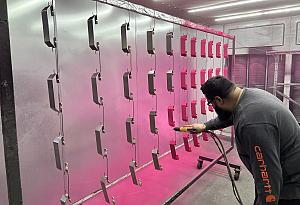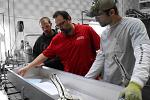- FMA
- The Fabricator
- FABTECH
- Canadian Metalworking
Categories
- Additive Manufacturing
- Aluminum Welding
- Arc Welding
- Assembly and Joining
- Automation and Robotics
- Bending and Forming
- Consumables
- Cutting and Weld Prep
- Electric Vehicles
- En Español
- Finishing
- Hydroforming
- Laser Cutting
- Laser Welding
- Machining
- Manufacturing Software
- Materials Handling
- Metals/Materials
- Oxyfuel Cutting
- Plasma Cutting
- Power Tools
- Punching and Other Holemaking
- Roll Forming
- Safety
- Sawing
- Shearing
- Shop Management
- Testing and Measuring
- Tube and Pipe Fabrication
- Tube and Pipe Production
- Waterjet Cutting
Industry Directory
Webcasts
Podcasts
FAB 40
Advertise
Subscribe
Account Login
Search
Study indicates manufacturing faces pressing need to evolve risk assessment capabilities
- March 30, 2015
- News Release
- Shop Management
A new study, "Understanding Risk Assessment Practices at Manufacturing Companies," conducted jointly by Deloitte and the Manufacturers Alliance for Productivity and Innovation (MAPI), uncovers complex business risks and disruptors facing manufacturers, as well as a pressing need for the industry to evolve its risk assessment capabilities.
The study looks at how manufacturing companies are assessing and responding to risks today and in the future. It finds that the current operating environment demands a more analytical, agile, and clinical view of risk to effectively address the complexity and velocity of critical risks and disruptions to their businesses.
Defining which characteristics can set a company apart competitively is critically important for risk management. Survey respondents ranked competitiveness drivers such as innovation and talent management as priority business risks, indicating leading practices in these areas may set a company apart. Risk management and data analytics also were classified as competitiveness capabilities.
Supply chains are highly complex and continuously exposed to a variety of internal and external risks. If not managed carefully, they can result in potential adverse effects to manufacturers' sales and brand reputations. The study indicates manufacturers should build resiliency into supply chains to address critical vulnerabilities proactively, as well as balance risk and costs to prevent or recover quickly from risk-related disruptions.
Implications of the skills gap in manufacturing also can affect manufacturers' growth and profitability. Internal audit can play a key strategic role in assessing programs designed to mitigate the anticipated talent shortage and skills gap risks.
Survey respondents indicated a variety of successful and ineffective assessment practices. Successful practices include interviews, periodic presentation of specific risk topics to the board committee tasked with governance, and integrating risk assessments into the strategic planning process with business units. Least effective practices include risk questionnaires or surveys that are too long or sent to too many people, accepting canned or repetitive risk mitigation responses, and risk assessments that are too narrowly focused.
Manufacturers today should consider their overall approach to risk. Strategic risks may be the most crucial ones facing many manufacturers, and each company should consider how well its current approach identifies and assesses such risks. Identifying and monitoring key risk indicators supports a holistic approach. According to the study, it places greater emphasis on detecting risks surrounding core business assumptions at an early stage, rather than responding to such risks once they are much more evident and more difficult to mitigate.
A holistic approach to risk and risk assessment—as well as continual attention from a board risk committee, a chief risk officer, and internal audit—helps embed risk consideration within a manufacturer's business culture. The enhanced ability to recognize and address strategic risks effectively can give a manufacturer a competitive advantage that enables it to not only survive but thrive amid change.
subscribe now

The Fabricator is North America's leading magazine for the metal forming and fabricating industry. The magazine delivers the news, technical articles, and case histories that enable fabricators to do their jobs more efficiently. The Fabricator has served the industry since 1970.
start your free subscription- Stay connected from anywhere

Easily access valuable industry resources now with full access to the digital edition of The Fabricator.

Easily access valuable industry resources now with full access to the digital edition of The Welder.

Easily access valuable industry resources now with full access to the digital edition of The Tube and Pipe Journal.
- Podcasting
- Podcast:
- The Fabricator Podcast
- Published:
- 04/16/2024
- Running Time:
- 63:29
In this episode of The Fabricator Podcast, Caleb Chamberlain, co-founder and CEO of OSH Cut, discusses his company’s...
- Industry Events
16th Annual Safety Conference
- April 30 - May 1, 2024
- Elgin,
Pipe and Tube Conference
- May 21 - 22, 2024
- Omaha, NE
World-Class Roll Forming Workshop
- June 5 - 6, 2024
- Louisville, KY
Advanced Laser Application Workshop
- June 25 - 27, 2024
- Novi, MI






























